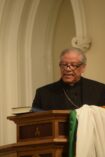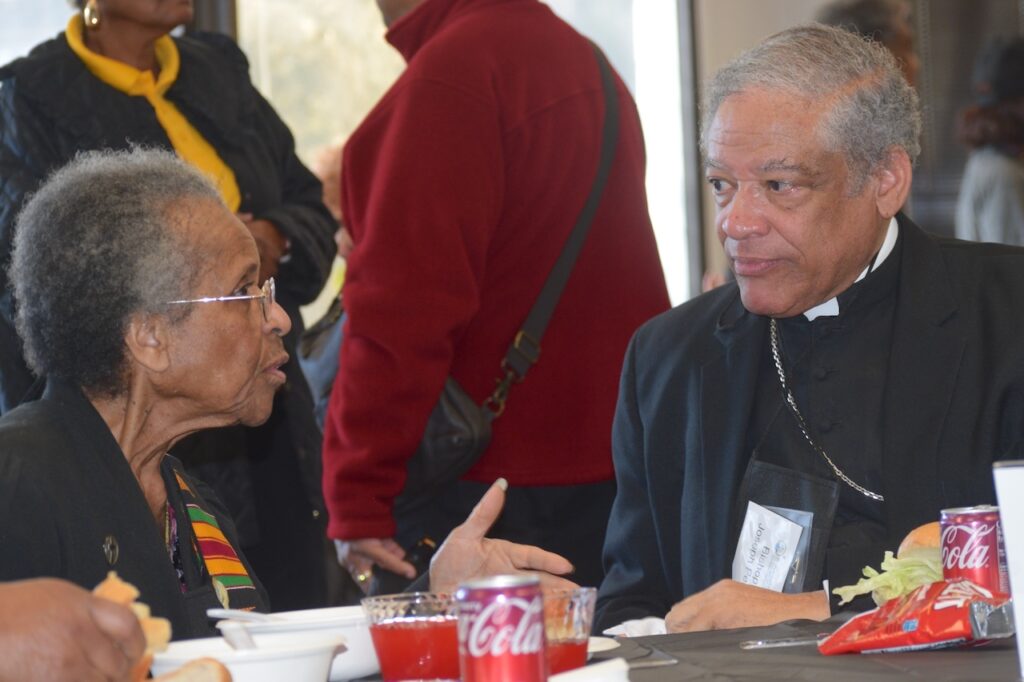Bishop Joseph N. Perry, retired auxiliary bishop of Chicago and chairman of the United States Conference of Catholic Bishops’ Ad Hoc Committee Against Racism, visited the diocese with a special message during Black History Month.
He gave a talk titled “Brothers and Sisters All: A Catholic Approach to the Unfinished Business of Race Bias” at the Basilica of St. Mary of the Immaculate Conception, Norfolk, Feb. 1. The diocesan Office for Black Catholics offered the event as part of its Year of Black Catholic Heritage, which began in November.
Bishop Perry began by reading Acts 2:1-11, in which St. Peter preached to a multi-ethnic crowd in Jerusalem on Pentecost. The Holy Spirit filled each person, and each person heard St. Peter spread the word about Jesus in his own language, indicating that the faith in the resurrected Jesus Christ should be shared with all peoples.
We are all brothers and sisters joined together in Christ, said Bishop Perry, but through the centuries we have forgotten that.
“‘In the fallen world, our relationships with one another have been guided by a lust to dominate,’ the United States bishops noted in their recent pastoral letter on the topic of racism,” he said.
“The conquest of lands, the discovery of new peoples, the rise of nation states brought with it competition, land grabs, the rise of kingdoms and fiefdoms and the typical dramas of greed and avarice or just raw ignorance about everything and everyone different,” Bishop Perry continued.

He also said that “conquest and progress were spelled in terms of the subjugation of peoples,” and the United States was no exception. Slavery here was such a norm that even Christian churches, especially Roman Catholic, Anglican and Episcopal, managed plantations with slaves.
The Civil War brought an end to slavery in the 1860s, but not to discrimination. Most churches and slave owners demanded compensation for setting their slaves free, and “laws and lawless customs emerged to make separation of the races the rule of life in the U.S.,” Bishop Perry added.
Injustices continued into the 20th century, said the bishop, including discriminatory practices within the Church. Most Catholic institutions and religious orders in the United States excluded Blacks until the latter part of the 20th century. Black people had to sit in separate areas from white people in churches and received the Eucharist last, he said.
Despite progress made as a result of the civil rights movement, Bishop Perry says the belief that “one man is less than another man is still in our culture.”
Bishop Perry said Catholics are “guided by the teaching of Jesus Christ to uphold the sanctity of all human life and therefore the inherent dignity of each and every person.”
“We all have biases, some of them innocent enough, other biases of a more sinister nature which can trip us up and leave us falling short of the Lord’s commandment to regard others just as we love ourselves,” said Bishop Perry.
He stressed the importance of teaching children about historical and present racial bias while instilling in them virtues that reflect Catholic teachings.
“Action steps such as these faced squarely out of the highest Christian sentiments go a long way to refashioning the moral environment of these times where everyone … can live alongside one another, relishing their God-given human dignity,” Bishop Perry said.
The audience was receptive to, and thankful for, Bishop Perry’s talk.
Father Jim Curran, rector of the basilica, said the presentation was “very, very timely” and that “it’s of the utmost importance to create a just society that must begin with the eradication of racism.”
Anne-Marie Marivoet, a parishioner at Immaculate Conception, Hampton, said the presentation underscored “how society conditions and shapes us” was a reminder that, “as Catholic Christians, we are called to do the work of uncovering these biases to truly meet each other as brothers and sisters in Christ.”

